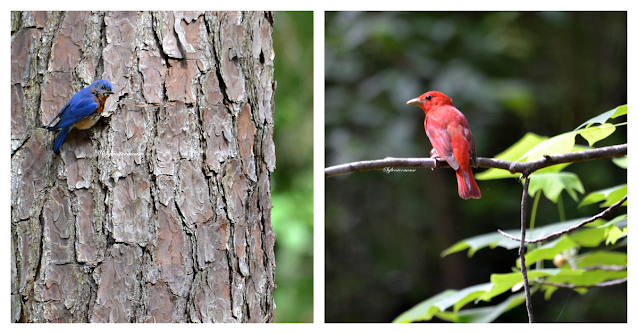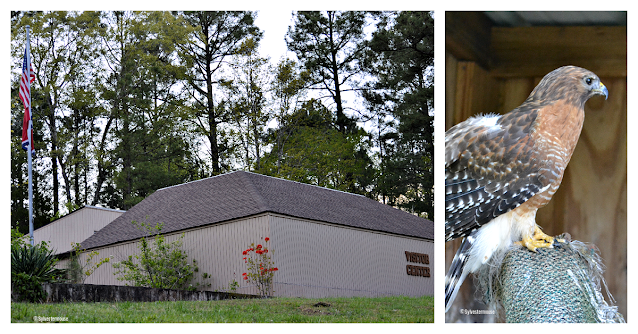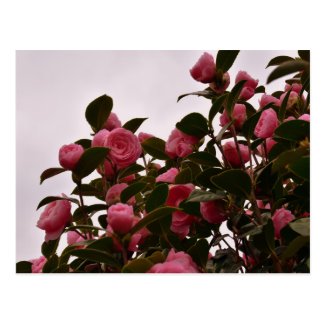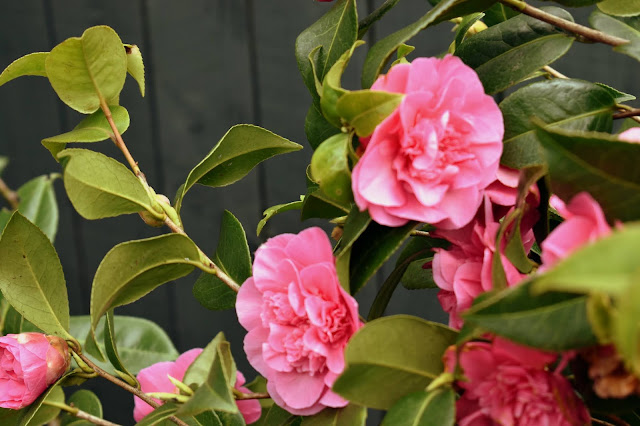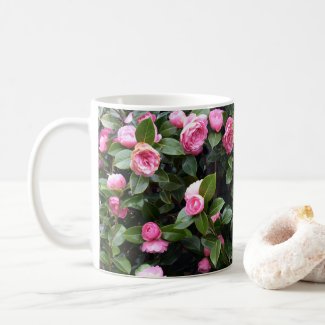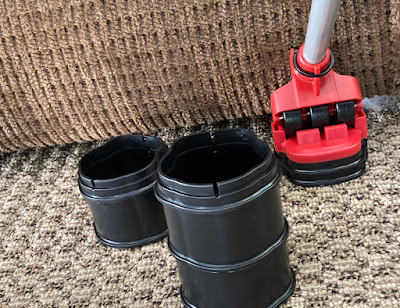I have always loved the beautiful Camellia. I see it as the beautiful rose
of Springtime. When we first moved here I thought one would look lovely in
the garden.
This one is now twenty years old and about ten foot tall and four foot
wide. It has been lightly pruned perhaps four or five times in its life so
far.
My Top 5 Reasons To Grow A Camellia
I love them because all year round they are evergreen with thick glossy
beautifully shaped leaves. Camellias provide a fantastic structure in the garden all year long and
make a superb hedge too
They look stunning when covered in snow as the dark green leaves and the
white snow complement each other beautifully.
They have the most stunningly beautiful flowers in Spring that lift your
heart and are a perfect shape and come in pinks, whites, creamy yellows and
reds mainly.
They need very little care once established and grow a dense bushy
appearance that no one can see through.
A mature Camellia provides excellent cover for small birds who also like to
nest in it.
Camellia Flower Blossoms
However, for all these marvelous attributes their true moment in the
spotlight arrives in early Spring and culminates in April and May.
From early March I am aware of tight fat buds appearing amongst the green
leaves, a promise of what is to come.
Battered by strong winds and rain here they hang on and remain tightly
compressed until the weather calms a while and the sun starts to shine and
warm up.
Then slowly the fat buds begin to unfurl revealing beautiful pink flower
buds. Over the coming weeks more and more unfurl and the green shrub becomes
a riot of pink blossom!
It is so stunningly beautiful and something I look forward to every
year.
Each flower petal is perfect a gorgeous unique soft yet strong
flower.
The petals are quite thick and not easily broken or torn and I noticed that
the birds often take the fallen petals to use in their nests. I can imagine
that each petal is perfect for laying eggs in and is very soft and
insulating for the little chicks.
The sparrows often nest in the Camellia and we often hear them chattering
away to each other, squabbling and bonding. Sometimes a huge flock will fly
into the Camellia and they disappear into it.
As the weeks go by the petals begin to fall and the earth around the
camellia is littered with a carpet of pink petals like a bride has passed
this way and has been showered with flowers.
Then by summer, we are back to a glossy evergreen shrub.
Where to Site A Camellia
Camellia generally needs to be sited in a position where there is light
sunlight, they are essentially woodland plants so light sun to dappled shade
is ideal. They do appreciate a more sheltered site and dislike cold biting
winds.
Never site your Camellia in an East facing spot as they actively dislike
it. Also, the buds appear to become damaged by the morning sun when east
facing so you will get fewer flowers. South or West facing is the best if
possible.
These shrubs do like acid soil but you may get away with a neutral soil
that is slightly acidic. As a woodland shrub, it appreciates a good mulch
with leaves each spring. You can also use pine needles or bracken or even
fir tree clippings if you have them available.
Probably the best time to plant is in the Autumn/Fall as the soil is still
warm and you may have more rain at this time of year.
When I first bought ours I planted it on one side of our garden and it
basically did nothing for 3 years and looked very unhappy and started to
die. So I dug it up and planted it on the other side of the garden where, as
you can see it quickly flourished and grew and blossomed.
I am still not sure why this happened as theoretically this first site was
ideal, but there was something the plant did not like. It is worth trying an
ailing plant in a different site before giving up.
Watering Camellia
When first planting, like any other shrub, do water regularly and deeply
every week especially in very hot weather. Do not just sprinkle water on, give it a really good deep drink. Unless it rains heavily I continue to do this with newly planted
shrubs for about a year to a year and a half. I find it gives them a good
start in life then afterward they are little trouble.
Light watering will be bad for the plant as it encourages roots to turn
upwards to seek the water on the surface. You need to really soak the soil
thoroughly so that the water is below the root level and the roots search
down and out for water.
Once it is mature and established you should not need to water at all
unless you live in an extremely dry climate or suffer drought conditions. If
small buds cease to grow or start to drop, or you do not see any buds, then
you know it is suffering drought.
Pruning Camellia
This is good news for people who do not like pruning! Camellias do not
really need much pruning. The only exceptions are if they grow either too
big or are growing in a shape you do not like.
If you need to prune only do it immediately after flowering. If you do it
any other time you will damage the emerging flower buds.
Please do not use a hedge trimmer on your gorgeous Camellia. The result is
so much better if you carefully prune with secateurs like these Wolf By Pass Secateurs It will take a little time but can be done gradually.
You can deadhead the faded Camellia flowers if you want to. I think this
would be possible on a smaller plant. With a Camellia ten-foot high for me,
it would be quite a time-consuming task.
Some people will want to do it though to prevent petal fall over the
borders. I do not do this as I like to see it naturally fade and I love to
see the pink petals fall to cover the earth and the lawn like a bride has
just passed by and guests have thrown confetti! Once they have fallen to the
ground, I just treat them as very pretty mulch.
Otherwise, you can let it grow and fade at its own pace and time and simply
enjoy it.
Taking Camellia Cuttings
Once you have a mature Camellia I would recommend taking cuttings. This way
you can over time have more Cameillas and if you ever move you can start a
new plant. They also make lovely gifts.
Cuttings are easy to take and so far I have had great success with them
forming roots and growing on well. They are, however, fairly slow to grow
from cuttings so plan ahead.
Soil Conditions For Camellia
It is advantageous to have acid soil but it can cope with a neutral to
slightly acid soil especially if you mulch with acid based materials or
an ericaceous compost and feed each spring.
To check your soil look around at your neighbour's gardens and see what
is growing well. If Acers, Azelias, Camellias and Rhododendrons are
growing happily in the soil then a Camellia should be just
fine.
The other way to check is to do a soil testing kit available in many
places where you can easily test your own soil.
If your soil is not suitable then do consider growing Camellia in a
container with ericaceous compost and using ericaceous plant food.
Growing Camellia In A Pot
I always have a "can do " attitude when it comes to gardening. Many people
have smaller plots and less room to grow in the soil so its important we
consider any plant that can be grown in a container.
In my experience yes, you can grow Camellia in a container. It will
need to be size appropriate and have good drainage holes.
Even if you start with a small cutting which you can pot on in a small
container, you will eventually need a large tree pot as they can grow
large. You may well need to repot into a larger container every 2 or 3
years.
You will need to provide everything for the shrub in terms of water and
food.
The big advantage is that you can move the shrub easily into its perfect
position to give it the correct sunlight and shelter positions and you can
take it with you if you move to another house.
Make sure the soil is ericaceous or acid soil as it needs the best
conditions to live happily in a container. I generally use this type of
ericaceous compost below and every gardener has their own preferences as
long as it is suitable for acid loving plants.
You will need to water well at least once a week. This is vital
in the autumn/fall as this is when the buds for the flowers are forming.
If you do not give it enough water at this time flower buds will not
form and that means no beautiful flowers.
Many people chronically underwater Camellia in pots and do not get
any flowers and think the shrub is not a good one to grow. This is so
easily remedied by simply watering. Especially make sure you water
enough in the autumn when buds are forming.
Rainwater from a water butt is best but if you do not have that
simply use tap water and ensure you are careful with feeding enough so
you maintain the acid balance in the soil. Feeding is also vital for container grown Camellias and an ericaceous
feed is recommended.
You may find as I do that a little more pruning is necessary. The one
in the container above is in need of both repotting and a prune to
reshape slightly so it sits the container better. I will prune it after
all the flowers have bloomed.
I love the Camillia and would recommend growing it. I see it as an
early rose-like flower without the thorns of most roses! I love to grow
Roses as well but Camellia flowers early before roses are in bloom and
gives a beautiful show of lovely colour along with the Spring flowers
and bulbs before the summer flowers bloom.
In the ground it is a real low maintenance shrub that can be easily
pruned into size and shape. In a container a little more care is
required but it is always a pleasure to look after.
I will always have at least one Camillia in containers and in the
garden, but most likely two or three!
More Gardening Articles
6 Ways To Help Wildlife In The Year Ahead
Gardening Articles On Review This Reviews
Note: The author may receive a commission from purchases made using links found in this article. “As an Amazon Associate, Ebay (EPN), Esty (Awin), and/or Zazzle Affiliate, I (we) earn from qualifying purchases.”
